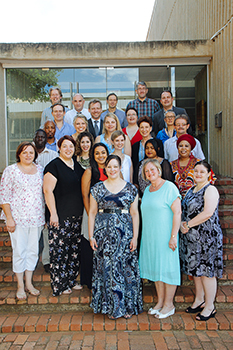Latest News Archive
Please select Category, Year, and then Month to display items
05 June 2018
Photo Supplied
 Archaeological excavations in the Wonderwerk Cave, north of Kuruman in the Northern Cape.
Archaeological excavations in the Wonderwerk Cave, north of Kuruman in the Northern Cape.
Research fellow Dr Lloyd Rossouw from the Department of Plant Sciences at the University of the Free State (UFS) recently published an article in the Nature Ecology and Evolution journal with Dr Michaela Ecker from the University of Toronto as lead author, and Dr James Brink, research fellow at the UFS Centre for Environmental Management. The findings described in “The palaeoecological context of the Oldowan-Acheulean in southern Africa” provides the first extensive paleoenvironmental sequence for the interior of southern Africa by applying a combination of methods for environmental reconstruction at Wonderwerk Cave, which have yielded multiple evidence of early human occupation dating back almost two million years ago.
Where water once was
The Wonderwerk Cave is found north of the Kuruman hills (situated in Northern Cape) a 140m long tube with a low ceiling. The surroundings are harsh. Semi-arid conditions allow for the survival of only hardy bushes, trees, and grasses. But during the Early Pleistocene, stepping out of the Wonderwerk Cave you would have been greeted by a completely different site, the researchers found. Using carbon and oxygen stable isotope analysis on the teeth of herbivores (Dr Ecker), fossil faunal abundance (Dr Brink), as well as the analysis of microscopic plant silica remains (phytoliths) excavated from fossil soils inside the cave (Dr Rossouw), the results show that ancient environments in the central interior of southern Africa were significantly wetter and housed a plant community unlike any other in the modern African savanna.
What difference does it make?
While East African research shows increasing aridity and the spread of summer-rainfall grasslands more than a million years ago, the results from this study indicate an interesting twist. During the same period, shifts in rainfall seasonality allowed for alternating summer and winter-rainfall grass occurrences coupled with prolonged wetlands, that remained major components of Early Pleistocene (more or less the period between one and two million years ago) environments in the central interior of southern Africa. That means our human ancestors were also living and evolving in environments other than the generally accepted open, arid grassland model.
Centre for Teaching and Learning honours excellence and innovation
2015-11-27

The 2015 Excellence in Teaching and Learning nominees with CTL management and Dr Lis Lange
|
Excellence and innovation. These were the qualities celebrated at the recent Excellence in Teaching and Learning Awards. Annually, the University of the Free State (UFS) Centre for Teaching and Learning (CTL) honours lecturers for their outstanding achievements in the classroom.
During the illustrious event, individual as well as group winners were announced in the category of the Vice Chancellor’s Award, as well as in several categories in the Innovation Awards. The winners of the Excellence in Teaching Awards were:
Vice-Chancellor’s Award
Individual
• Louise van den Berg (Faculty of Health Sciences)
Teaching team
• Salomien Boshoff and Naquita Fernandes (Faculty of Economic and Management Sciences)
Innovation Awards
Engagement and Learning
• Lerato Sekonyela (Faculty of Economic and Management Sciences)
• Rentia Engelbrecht, Jolandi Bezuidenhout, and Jamie-Lee Nortje (Faculty of the Humanities)
Curriculum Design
• Joyce Ras (Faculty of Economic and Management Sciences)
• Adre le Roux and Frans Kruger (Faculty of Education)
Community Engagement
• Martin Oliver (Faculty of Economic and Management Sciences)
• Ielse Seale and Karen Venter (Faculty of Health Sciences)
Assessment Practices
• Joyce Ras (Faculty of Economic and Management Sciences)
• Salomien Boshoff (Faculty of Economic and Management Sciences)
The awards serve to celebrate excellence among the university’s academic staff, while showcasing current best practice, and inspiring innovation among lecturers.
In aid of this, CTL hosted a showcase following the award ceremony. Academic staff and the broader university community could look over the various entries for new insights and added inspiration. A series of workshops and activities explored themes such as professionalism, and lectureship, as well as various apps that can be used in higher education.